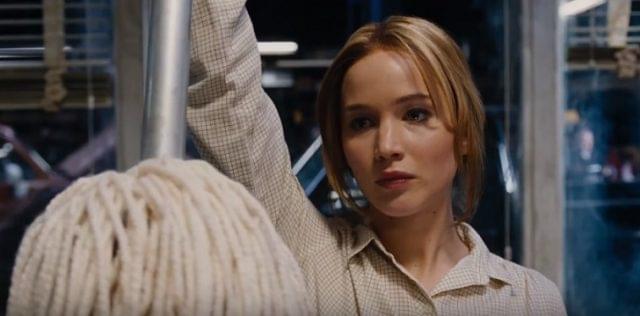
“Joy” is a strange muddle of a film, frequently entertaining as it moves along but ultimately disappointing as we discover it’s not heading anywhere. It’s partly a biopic of a real person, but one whose last name is never given. (This remains true even in situations when she’s introducing herself to people who tell her their last names.) It’s partly a domestic comedy about a frazzled single mother in a chaotic household, but there’s little payoff to any of the threads with her mother, father, ex-husband, or children.
Mostly, it just seems to be an excuse for David O. Russell (“Silver Linings Playbook,” “American Hustle”) to work with Jennifer Lawrence, Bradley Cooper, and Robert De Niro again. He rewrote Annie Mumolo’s screenplay and cast 25-year-old Lawrence as a 35-year-old character, with De Niro as her father. Cooper wasn’t suitable for any of the major roles, so Russell had him play a secondary one, probably figuring the folks in marketing would make it look like Cooper has more scenes with J-Law than he actually does. (They did.)
Set in an unspecified but approximately late-1980s era, “Joy” claims to be “inspired by daring women, one in particular.” That’d be J-Law’s Joy, a headstrong divorcee who lives with her mother, Terry (Virginia Madsen), her grandmother, Mimi (Diane Ladd), and her children (irrelevant). Her Brazilian ex-husband, Tony (Edgar Ramirez), lives in the basement, where he’s soon joined by her father, Rudy (De Niro), when his new wife throws him out. (Tony and Rudy don’t get along, so Joy divides the basement with a piece of tape, sitcom-style.) Terry, fearful of the outside world in a way the movie never addresses, does nothing but sit on her bed and watch soap operas all day. Mimi, who’s about the same age as her daughter’s ex-husband (this is not addressed either), periodically acts as narrator but plays no other part in the story. Joy’s half-sister, Peggy (Elisabeth Röhm), hangs around to make Joy feel inferior.
Stuck in her role as housekeeper and peace negotiator, forever keeping her fractured family together (why?), Joy is unappreciated for her talent and ambition. This starts to change when she comes up with an idea for a new kind of mop, one that doesn’t require you to put your hands in filthy water to wring it out. With some financial aid from her father’s new girlfriend, Trudy (Isabella Rossellini), Joy builds a prototype and starts selling mops — independently at first, until she learns about a TV channel called QVC, where things like special mops are sold 24 hours a day. (Cooper plays one of QVC bosses.)
This is where the movie at last begins to find its focus as the story of a scrappy entrepreneur who won’t take no for an answer, who competes against the big boys despite being 1) a woman and 2) not a corporation. The QVC sequences are appealing (watch for Melissa Rivers as Joan Rivers!), and Joy’s battles with conniving businessmen are satisfyingly staged. Jennifer Lawrence is never less than her usual engaging self, and apart from being too young and glamorous to pull off “harried single mom,” her performance as an underdog is solid.
So what’s with all the other stuff? The insanity of Joy’s household offers some amusing moments, but by occupying so much screen time without making any thematic contributions, it undermines the film. All those scenes of Terry being obsessed with soap operas come to naught when Terry basically disappears from the story. Tony, the ex-husband, helps Joy with business connections, but everything else about him is extraneous. You get the feeling all the complicated details of these people’s lives were included just because they’re true, not because they help tell the story. They actually do the opposite, cluttering things up so thoroughly that it’s often unclear what the real story is. Without the mud, this might have been a snappy 90-minute crowd-pleaser about a woman taking on the system. As it is, it’s a meandering two hours punctuated by upbeat moments but not nearly enough joy.
C+ (2 hrs., 4 min.; )





